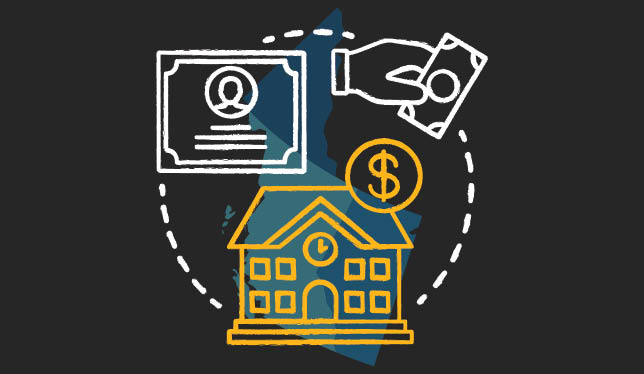Provincial budget reports: Alberta, British Columbia and Yukon
Alberta is implementing a two per cent cap on domestic tuition increases while British Columbia is investing significantly in its postsecondary education sector.

As the new fiscal year gets underway, Canadian provinces and territories have rolled out their spending plans for 2024-25. University Affairs scoured each of the budget documents and extracted what has been earmarked for the higher education sector. Below is a summary of what those working at the western and Yukon university communities should know. We have also done budget summaries of the Atlantic provinces, Ontario and Quebec, as well as the Prairies.
Alberta
Alberta’s United Conservative Party government tabled its budget on Feb.29. It allocates $5.6 billion for postsecondary education, an increase of $81 million from what the province had forecasted. That includes $2.5 billion in direct operating support to Alberta’s 26 publicly funded postsecondary institutions.
The Alberta government, however, noted that universities will be expected to pay for an increasing proportion of their costs over the next two years, up to 58 per cent of their operating expense in 2026-27. The province will also be implementing a two per cent cap on domestic tuition increases beginning this year.
As part of the 2024-25 budget, the government announced:
- $55 million for the University of Calgary beginning in 2025-26 to increase student enrolment in science, technology, engineering and math programs
- $37 million to the U of C to complete the expansion of its veterinary medicine school
- $34.9 million in capital maintenance and renewal at the University of Alberta
- $20 million for Mount Royal University to repurpose existing facilities
- $10 million this year to MacEwan University business school to expand capacity in high-demand sectors
- $4 million this year to the University of Lethbridge rural medicine teaching school
- $2 million over two years to the U of A’s Campus Saint-Jean for upgrades to “foster transdisciplinarity, inclusion and innovation”
Reaction
The Confederation of Alberta Faculty Associations (CAFA) issued a statement in which President Dan O’Donnell argued that the province is continuing its erosion of public colleges and universities, after it first began cutting funding to universities four years ago. Funding for public sector colleges and universities is projected to increase only 1.5 per cent, well below inflation, while the province has increased taxpayer support for for-profit colleges by nearly 25 per cent, according to CAFA. “This creeping privatization is how you destroy years of public investment,” said Mr. O’Donnell.
The U of A’s provincial operating grant will be $436.6 million this year – the same amount it received each of the last two years. In a response to the budget, President Bill Flanagan noted that inflation has risen by over 10 per cent during that time, which has led to increasing pressure on the institution.
British Columbia
British Columbia’s New Democratic Party government released its 2024-25 budget on Feb. 22. The province earmarked $3.3 billion this year for postsecondary education and “future skills” – a 17 per cent increase from what was forecasted last year.
This year’s spending features:
- $139 million for construction of the engineering and computer science building at the University of Victoria
- $106 million for Royal Roads to build a West Shore Learning Centre in collaboration with the University of British Columbia, UVic and Camosun College
- A $25 million follow-on investment to finish the construction of Capilano University’s Centre for Childhood Studies
- $5 million for specialized equipment to create a Rapid Air Improvement Network at UBC
- $5 million for computing upgrades to the Simon Fraser University supercomputer data centre
Since the government’s second quarterly report in November, it has also announced new spending on specific projects at UBC:
- $195 million for construction of a six-story Gateway Building to house the schools of kinesiology and nursing, faculty of arts and language sciences and health and integrated health services
- $165 million for a second phase of student housing developments
- $147 million for a new 11-story UBC Sauder School of Business building
- $119 million for UBC Okanagan’s x̌ əl sic snpax̌nwixʷtn, an engagement, collaboration and interdisciplinary research building
- $68 million for the UBC Recreation Centre North
- $54 million for a new UBC Okanagan building in downtown Kelowna
The government noted in its budget that unexpected changes in federal policies, such as the recently announced cap on international students, could impact postsecondary student-related revenues and spending.
Reaction
The Confederation of University Faculty Associations of British Columbia (CUFA BC) stated it welcomes the stable investment made in postsecondary education. However, the group noted that the budget provided little reassurance surrounding the “coming financial fallout” from the international student caps. The BC Federation of Students said the budget is a step in the right direction, but “still fails to make up for decades of decreased operational budgets” to institutions.
Yukon
Yukon’s territorial government led by Premier Ranj Pillai is projected to spend $93 million on education in 2024-25, a portfolio which includes early learning and child care, public schools and postsecondary education. Yukon University, Canada’s only university in the territories, will receive $31 million – one third of total spending – for its operating budget.
The funding includes:
- $1.4 million for Yukon University’s Research Centre
- $1.2 million for the Northern Innovation in Mining Centre
- $741,000 for a licensed practical nurse program
- $600,000 for upgrades to the campus, housing, information technology systems and furniture and equipment
- $450,000 for the Northern Institute of Social Justice
- $75,000 for Yukon University students exploring trades
The university will also receive $835,000 in 2024-25 from the ministry of economic development for innovation and entrepreneurship as well as $100,000 from the ministry of the environment for climate change research.
Featured Jobs
- Canada Excellence Research Chair in Computational Social Science, AI, and Democracy (Associate or Full Professor)McGill University
- Veterinary Medicine - Faculty Position (Large Animal Internal Medicine) University of Saskatchewan
- Psychology - Assistant Professor (Speech-Language Pathology)University of Victoria
- Business – Lecturer or Assistant Professor, 2-year term (Strategic Management) McMaster University















Post a comment
University Affairs moderates all comments according to the following guidelines. If approved, comments generally appear within one business day. We may republish particularly insightful remarks in our print edition or elsewhere.